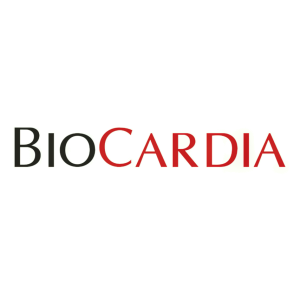BioCardia Announces CardiAMP Chronic Myocardial Ischemia Trial Top Line Data of Roll-in Cohort Show Improved Exercise Tolerance and Reduced Angina Episodes at Six-Month Primary Follow-up
Rhea-AI Summary
BioCardia (NASDAQ: BCDA) reported positive top-line data from the roll-in cohort of its CardiAMP® Cell Therapy trial in Chronic Myocardial Ischemia patients. The study demonstrated that patients experienced an average 80-second increase in exercise tolerance and an 82% reduction in angina episodes at the six-month primary endpoint.
The minimally-invasive procedure showed promising results with 60% of patients experiencing substantial improvements in both measures. The therapy was well-tolerated with no treatment emergent major adverse cardiac events, and results compared favorably to current FDA-approved therapies like Ranolazine and Enhanced External Counter Pulsation (EECP).
Positive
- Significant 82% reduction in angina episodes at 6-month follow-up
- 80-second average increase in exercise tolerance
- 60% of patients showed substantial improvements in both key measures
- No treatment emergent major adverse cardiac events reported
- Results compare favorably to current FDA-approved therapies
Negative
- None.
News Market Reaction – BCDA
On the day this news was published, BCDA declined 23.78%, reflecting a significant negative market reaction. Argus tracked a peak move of +42.8% during that session. Argus tracked a trough of -60.0% from its starting point during tracking. Our momentum scanner triggered 33 alerts that day, indicating elevated trading interest and price volatility. This price movement removed approximately $3M from the company's valuation, bringing the market cap to $9M at that time. Trading volume was exceptionally heavy at 150.1x the daily average, suggesting significant selling pressure.
Data tracked by StockTitan Argus on the day of publication.
SUNNYVALE, Calif., Sept. 18, 2025 (GLOBE NEWSWIRE) -- BioCardia, Inc. (NASDAQ: BCDA), a developer of cellular and cell-derived therapeutics for the treatment of cardiovascular and pulmonary diseases, today announced the primary endpoint results of the open label roll-in cohort of the CardiAMP® Cell Therapy in Chronic Myocardial Ischemia Trial.
Results from the open label roll-in cohort patients having chronic myocardial ischemia with refractory angina show that the minimally-invasive CardiAMP Cell Therapy procedure was well tolerated with no treatment emergent major adverse cardiac events. All patients were on guideline-directed medical therapy (GDMT) and responded positively to the autologous cell therapy. Patients experienced increased exercise tolerance of an average of 80 seconds and an average of
These early, open-label results compare favorably to those demonstrated by current FDA approved therapies such as Ranolazine and Enhanced External Counter Pulsation (EECP) (1,2,3). Patients already on Ranolazine experienced dramatic reduction in angina episodes at the six-month follow-up. These results are in line with previous compelling investigational trial results utilizing cost prohibitive cell therapy (4).
“With these final roll-in results, this novel investigational therapy shows promise in addressing debilitating refractory angina, a significant unmet need for patients with chronic myocardial ischemia,” said Carl Pepine, MD, MACC, Professor of Medicine, Division of Cardiovascular Medicine, University of Florida at Gainesville.
“We are working with our investigators to submit these results for peer reviewed scientific publication,” said Peter Altman, President and CEO. “The results from this roll-in cohort supports our continued development of this novel therapeutic approach for chronic myocardial ischemia with refractory angina and enhances the value of our CardiAMP cell therapy platform.”
About Chronic Myocardial Ischemia with Refractory Angina
Chronic myocardial ischemia occurs in the setting of coronary artery disease when there is reduced blood flow to the heart. This causes angina, a type of chest pain which is characterized as refractory angina when this pain cannot be controlled by a combination of optimal medical therapy, angioplasty or bypass surgery, and is estimated to impact 600,000 to 1.8 million patients in the United States. Up to
About the CardiAMP Cell Therapy Program
Designated by the FDA as a Breakthrough Therapy for Ischemic Heart Failure, CardiAMP Cell Therapy uses a patient’s own bone marrow cells delivered to the heart in a minimally invasive, catheter-based procedure to potentially stimulate the body’s natural healing response. CardiAMP Cell Therapy incorporates three proprietary elements not previously utilized in investigational cardiac cell therapy: a pre-procedural cell analysis for patient selection, a high target dosage of cells, and a proprietary delivery system that has been shown to be safer than other intramyocardial delivery systems and exponentially more successful in cell retention. The CardiAMP cell therapy trials for the indications of both chronic myocardial ischemia and ischemic heart failure are covered by the Center for Medicare and Medicaid for both treatment and control procedures. CAUTION - Limited by United States law to investigational use.
About BioCardia®
BioCardia, Inc., headquartered in Sunnyvale, California, is a global leader in cellular and cell-derived therapeutics for the treatment of cardiovascular and pulmonary disease. CardiAMP® autologous and CardiALLO™ allogeneic cell therapies are the Company’s biotherapeutic platforms with three cardiac clinical stage product candidates in development. These therapies are enabled by its Helix™ biotherapeutic delivery and Morph® vascular navigation product platforms, and soon the Heart3D™ fusion imaging platform. BioCardia selectively partners on biotherapeutic delivery with peers developing important biologic therapies. For more information visit www.biocardia.com.
Reference:
1Stone PH, Gratsiansky NA, Blokhin A, Huang IZ, Meng L; ERICA Investigators. Antianginal efficacy of ranolazine when added to treatment with amlodipine: the ERICA (Efficacy of Ranolazine in Chronic Angina) trial. J Am Coll Cardiol. 2006 Aug 1;48(3):566-75. doi: 10.1016/j.jacc.2006.05.044. Epub 2006 Jun 15. PMID: 16875985.
2 Sendón JL, Lee S, Cheng ML, Ben-Yehuda O; CARISA study investigators. Effects of ranolazine on exercise tolerance and angina frequency in patients with severe chronic angina receiving maximally-tolerated background therapy: analysis from the Combination Assessment of Ranolazine In Stable Angina (CARISA) randomized trial. Eur J Prev Cardiol. 2012 Oct;19(5):952-9. doi: 10.1177/2047487312450133. Epub 2012 Jun 11. PMID: 22689417.
3 Arora RR, Chou TM, Jain D, Fleishman B, Crawford L, McKiernan T, Nesto RW. The multicenter study of enhanced external counterpulsation (MUST-EECP): effect of EECP on exercise-induced myocardial ischemia and anginal episodes. J Am Coll Cardiol. 1999 Jun;33(7):1833-40. doi: 10.1016/s0735-1097(99)00140-0. PMID: 10362181.
4Henry TD, Losordo DW, Traverse JH, Schatz RA, Jolicoeur EM, Schaer GL, Clare R, Chiswell K, White CJ, Fortuin FD, Kereiakes DJ, Zeiher AN, Sherman W, Hunt AS, and Povsic TJ. Autologous CD34 cell therapy improves exercise capacity, angina frequency and reduces mortality in no-option refractory angina: a patient-level pooled analysis of randomized double-blinded trials, European Heart Journal, 2018.
Forward Looking Statements:
This press release contains forward-looking statements that are subject to many risks and uncertainties. Forward-looking statements may include, among other things, statements relating to the continued development and cost of BioCardia’s autologous cell-based therapies, the probability of success of the CardiAMP clinical trials, ability to offset clinical costs utilizing Medicare reimbursement and the ultimate success of our clinical cell therapy programs. These forward-looking statements are made as of the date of this press release.
We may use terms such as “believes,” “estimates,” “anticipates,” “expects,” “plans,” “intends,” “may,” “could,” “might,” “will,” “should,” “approximately” or other words that convey the uncertainty of future events or outcomes to identify these forward-looking statements. Although we believe that we have a reasonable basis for each forward-looking statement contained herein, we caution you that forward-looking statements are not guarantees of future performance and that our actual results may differ materially from the forward-looking statements contained in this press release. Factors that could cause or contribute to such differences include, but are not limited to, the Company’s liquidity position and its ability to raise additional funds, as well as the Company’s ability to successfully advance its clinical trials. As a result of these factors, we cannot assure you that the forward-looking statements in this press release will prove to be accurate. Additional factors that could materially affect actual results can be found in BioCardia’s Form 10-K filed with the Securities and Exchange Commission on March 26, 2025, under the caption titled “Risk Factors,” and in our subsequently filed Quarterly Reports on Form 10-Q. BioCardia expressly disclaims any intent or obligation to update these forward-looking statements, except as required by law.
MEDIA CONTACT:
Miranda Peto, Investor Relations
mpeto@biocardia.com
(650) 226-0120
INVESTOR CONTACT:
David McClung, Chief Financial Officer
investors@biocardia.com
(650) 226-0120







